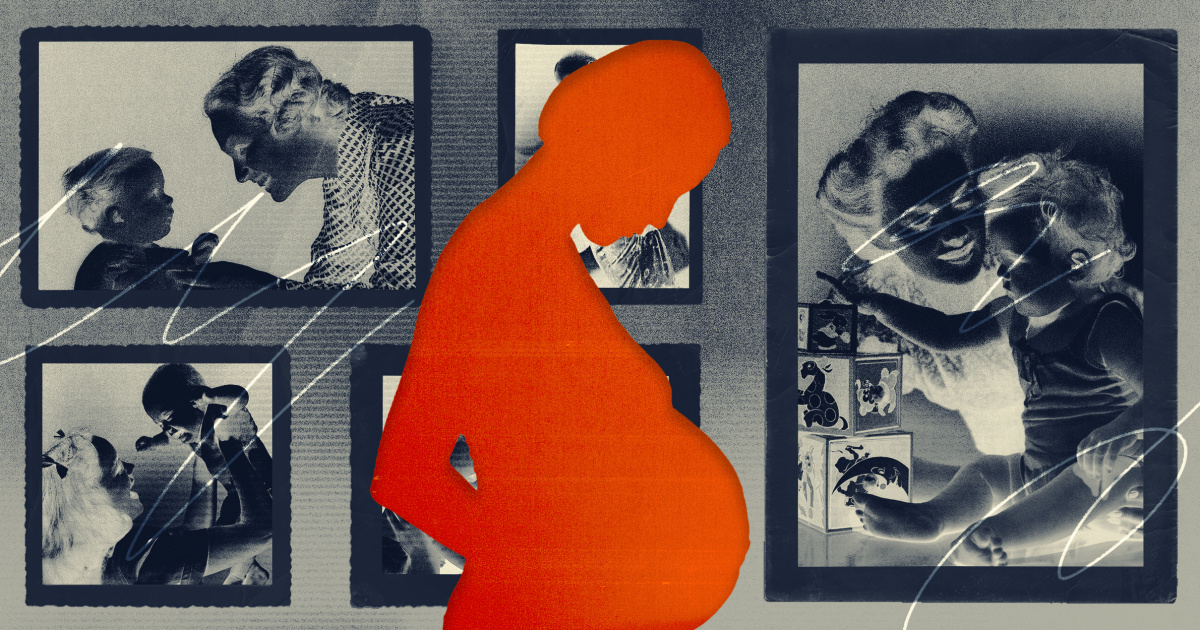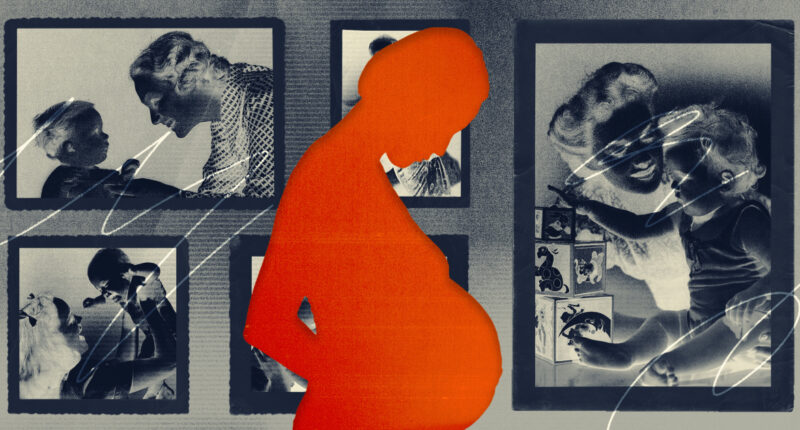
When TikTok creator and then-new mother Sarah Biggers-Stewart opened up about her postpartum experience and difficult pregnancy in a video last year, one viewer’s comment caught her eye: “Where’s the girl with the list?”
In recent months, the phrase has become a common response to videos about pregnancy and birth on TikTok.
The “list” refers to a crowdsourced file titled “Yuni’s Pros and Cons List of Having Children,” in which arguments against getting pregnant vastly outnumber reasons for having children. The cons range from common pregnancy symptoms like nausea and bloating to lesser known issues, like “their tiny foot might get stuck in your ribs, and you may crack a rib.”
Though some of its critics say the list fuels fearmongering and misinformation, other creators have praised the list for inspiring more honest discussions about pregnancy and birth. Regardless of its reception, the list marks a shift in the way pregnancy is discussed online and reveals a need for more comprehensive health education. The list’s rising popularity also dovetails with the push to preserve reproductive rights after the Supreme Court overturned Roe v. Wade, which had guaranteed a constitutional right to abortion.
Biggers-Stewart, who is now pregnant with her second child, described the list videos as “a powerful tool for self-advocacy.”
“I was totally shocked by all the things that could happen to you. And that’s even in today’s modern world, which is shocking with the amount of research and access that we have at our fingertips,” Biggers-Stewart said. “There’s so many different types of complications, and it can be really brutal on women. So I was like, this is empowering.”
Biggers-Stewart, who works in the beauty industry, noted that platforms like TikTok and Reddit provide an alternative perspective to the highly curated pregnancies traditionally portrayed on social media and parenting blogs. Authenticity, even if it’s manufactured, is highly valued on TikTok.
“What people expect is that the ones that have complications went into pregnancy sick. That’s why you had complications, or you didn’t take care of yourself, or you smoked, or you didn’t eat well,” Dr. Shannon Clark, an obstetrician-gynecologist who specializes in treating high-risk pregnancies, said. “It was always a kind of victim blaming, that people who had pregnancy complications probably did something to cause it. But what we’re realizing now is that that’s not always the case.”
Who’s the girl with the list?
The list first went viral in February 2022 when TikTok creator yuniquethoughts posted a screen recording of her Apple Notes app list in response to a video about postpartum bodily changes. In the months following, the creator, also known as Yuni, updated the list in TikToks stitching other videos about pregnancy, birth and parenting. Viewers frequently tagged Yuni in other creators’ videos, which evolved into the viral phrase, “Where’s the girl with the list?”
Yuni stopped posting on TikTok around August and did not respond to requests for comment. Before she stopped posting, she published the full list of 35 “pros” and 350 “cons” on her website. Her list inspired copycat accounts and similar Notes app lists.
In a video under the trend, one creator showed her “Pac-Man” ear, which was permanently torn after her infant daughter ripped her earring off. Another creator who used the tag #pregnancylist said her son “almost unalived” her — a common TikTok euphemism to refer to death — during his birth despite her relatively healthy pregnancy. Others who used the tag #girlwiththelist have posted about the health issues they had, from debilitating joint pain to heart failure. Some said they didn’t expect postpartum depression to hit so hard.
Many TikTok users, regardless of whether they’re pregnant or don’t have children, say they didn’t know about the various complications that can arise during pregnancy until they saw the viral list videos. In response to Biggers-Stewart’s recent video about the list, a TikTok user commented: “I wish I had that pregnancy list before getting pregnant. I was NOT prepared for what happened to me and the school system didn’t tell me either.”
I really believe when women think they are the only people experiencing this particular aspect of pregnancy, they’re less likely to talk to their doctors and they’re less likely to advocate for themselves because they feel silly.
TIkTOk creator sarah biggers-stewart
Motherhood has been exalted throughout history, but that reverence can overshadow conversations about the unpleasant and at times dangerous aspects of pregnancy. Experiencing such a difficult pregnancy can be isolating, Biggers-Stewart said, and the conversations accompanying the list can inform viewers of “things that might be going wrong.” She said that during her first pregnancy, she developed gestational diabetes, severe insomnia and a litany of other health issues that she wasn’t prepared for despite considering herself well-researched.
“All of the girlfriends I’d had who had pregnancies did have magical, beautiful, lovely pregnancies. I was sick from the day I found out I was pregnant until the day I gave birth,” she said of her first pregnancy. “I really believe when women think they are the only people experiencing this particular aspect of pregnancy, they’re less likely to talk to their doctors and they’re less likely to advocate for themselves because they feel silly.”
Beware of misinformation
While the conversations surrounding the list can be empowering, experts warn that misinformation is rampant on TikTok, and some who post videos can lack the reproductive health education needed to provide proper guidance to pregnant people. Some viral videos about the list have also been criticized by medical professionals for sensationalizing pregnancy complications and neglecting to provide context.
Absurd claims that are loosely based on real health conditions repeatedly circulate on TikTok. One viral addition to many list videos, for example, claims that pregnancy can cause tooth loss because the fetus needs their mother’s bone marrow and calcium.
Clark said that pregnancy can exacerbate oral issues that a patient already had before getting pregnant, and that many dentists will opt to postpone certain procedures until after the patient gives birth. Vomiting can also erode teeth, she said, and high hormone levels can aggravate gingivitis, which may lead to bleeding gums and loose teeth if left untreated. But telling viewers that babies leech off of their mother’s bones to grow their own will probably receive more engagement.
Patients often turn to the internet because “providers are failing to explain” what’s really happening to their bodies, Clark said. To a doctor, terms like “placental abruption” and “cervical incompetence” are “routine.” To an expecting parent, it can be terrifying.
“It’s not routine to the average person. We have to respect that and sit down and talk to them about that,” Clark said. “Because if we don’t, they are going straight to social media. … Hopefully they’ll go to an account that does give accurate information, such as mine, but many times they don’t and they’ll go to an account that doesn’t. What does that make them think? That you’re not doing your job as a provider, which further deepens the divide in the physician-patient relationship when it comes to care.”
It’s a ‘thin line’ between informative and insensitive
Content about the list has veered from Yuni’s, sparking debate over whether or not the trend is insensitive. Countless accounts that imitate Yuni’s original list format have gone viral and gained their own followings, causing confusion over who “the girl with the list” really is.
Some TikTok users expressed offense over “pregnancy nose” videos, in which creators showed viewers how much their faces changed during pregnancy. Others chastised TikTok users for flooding any video about pregnancy and birth with comments about the list. Parents who poke fun at themselves by asking for “the girl with the list” in their videos are willingly engaging with the trend. But TikTok users also barrage creators who post vulnerable content, like expressing insecurity over their postpartum body or discussing birth trauma, with comments about the list.
The list started as a “crowdsourced informed consent tool,” Biggers-Stewart said, but it’s “transitioned” over time, and “people don’t always use common sense.”
“They’ll comment on very sensitive videos where someone is talking about something traumatic that happened to them, and it’s very clear they’re in emotional distress about it,” Biggers-Stewart said. “And someone will be like, ‘Where’s the girl with the list?’ I think some people on TikTok, like everything else, take it out of proportion and don’t use their brains on when to mention the list.”
Abigail Porter, a TikTok creator known for her “Free Birth Control” series about combating baby fever by discussing reasons to not have children, is often mistaken as “the girl with the list.” Porter started her series in 2021 and said she became friendly with Yuni before she went offline, since their content was similar.
Porter has made multiple videos informing viewers about Yuni’s original list, and she said she’s frustrated by the way Yuni’s idea has been used to demean new mothers. Unlike many videos about the list, which typically go viral for reacting to an unsuspecting creator’s video, Porter said her series only uses content with the permission of the original creator. She added that many mothers directly tag her in videos for her series.
“It’s a thin line because these things that can happen to your body during pregnancy, they can be traumatic, and they are a perfectly valid reason to not want kids,” she said. “If I’m going to do a video about bodies in particular and show somebody’s body, I’m going to make sure that I have consent from that mother first — like if she posted a video and she made this acknowledgement like, ‘This is my body. It’s pretty crazy. The things that have happened in my body is pretty wild.’”
The list, and similar content like Porter’s “Free Birth Control” series, can be a helpful start for preparing for “all possibilities” during pregnancy, Biggers-Stewart said. For Porter, however, the candid videos about pregnancy and birth further affirmed her decision to not have children.
Despite its faults, the list reminds viewers of the power of choice, Porter said. Women have been expected to birth and raise children for centuries. Porter said she hopes her content and other videos about the list encourage viewers to critically consider all aspects of parenting before having children, rather than make a decision that they feel pressured into.
“I have such a respect and a reverence and an admiration for the people who do choose to go through with this, because it is a huge choice,” Porter said. “I hope people will stop treating having children as an impulse decision that everyone does. I think that’s better for us and also for the children, because if every child that was ever born had parents that really, really wanted them, I think the world would be a better place.”
Source: | This article originally belongs to Nbcnews.com










